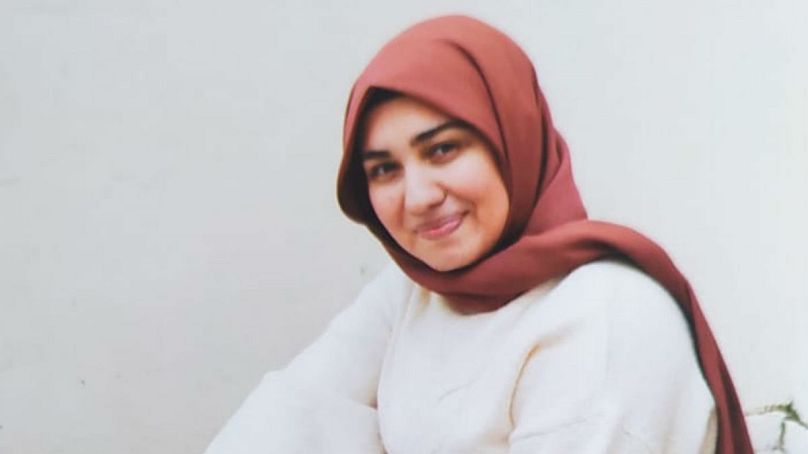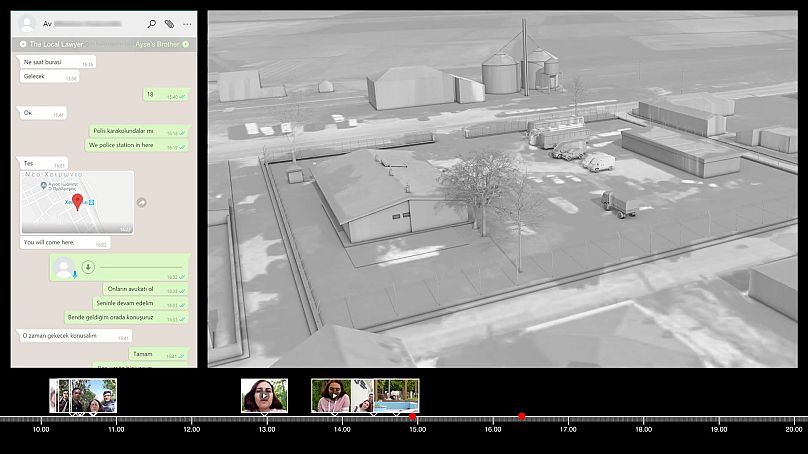Ayse Erdogan says the Greek authorities forced her back over the border to Turkey - in contravention of international law - and she has the evidence to prove it.
A Turkish woman is suing the Greek state over allegations police returned her to Turkey when she tried to claim asylum in Greece.
Greece is a signatory to the European Convention on Refugees, which makes it illegal for asylum seekers to be refused or returned to countries where they are at risk.
Ayse Erdogan, 28, spoke to Euronews from Gebze prison, where she has been held since she was sent back to Turkey by Greek police on May 5, 2019.
She had tried to claim asylum in the Greek village of Cheimonio, and was also refused medical treatment for a sprained ankle.
Erdogan, a teacher, had crossed the border between Turkey and Greece a day earlier, on May 4, while awaiting trial in Turkey on terrorism charges. She is accused of being a member of the Gulen movement, which Ankara blames for a failed 2016 coup against the Turkish state.
Ankara has designated the group, headed by self-exiled cleric Fethullah Gulen a terrorist organisation, referring to it with the acronym FETO, the Fetullahist Terror Organisation.
“I have been in this cell for a long time, which tires me out. I came within an inch of meeting with my twin brother after years before the Greek police pushed me back,” she told Euronews. “I will never forget how they made me suffer.”
“I went through heavy stuff. I did not go to Greece to loot the country. I was not even planning to stay there, but move to another European country. I had to leave my country because the state branded me as a terrorist.”
But Eleni Takou, deputy director and head of advocacy at HumanRights360, said that witnesses and victims claim that so-called “push-backs” happen almost every day across the Evros river, where thousands of migrants cross each year.
The Greek authorities have denied that Erdogan was ever in Greece, but Forensic Architecture, a research agency at Goldsmiths, University of London, released a video in February in collaboration with HumanRights360 that it claims is evidence that she was.
Euronews has reached out to the Greek government for comment.
Ayse recorded footage of her journey, including dropped pins on mobile phone application WhatsApp and a video diary which documents her journey.
“Security officers usually confiscate or throw migrants’ phones into the river before forcing them to go back. With this regard, Ayse’s case is a very strong one,” said Takou.
Forensic Architecture researcher Stefanos Levidis added: “For the first time, we can see her whole journey, her being in the country and the police station, as she recorded it. Thus we could do spatial analysis and create multimedia evidence showing the push-back.”
“We were able to prove that Ayse crossed from Turkey and she was in Chimonio police station. She disappeared then and appeared only in a Turkish prison again.”
For Levidis Erdogan’s story shows firsthand a young woman “crushed between two stones", Turkey and Greece.
The video has been submitted to the public prosecutor of Orestiada, Evros, by lawyers for Erdogan.
Klotildi Prountzou, a lawyer from the Greek Council for Refugees NGO, says FA’s remodelling is additional proof that the pieces of the story add up.
It is appealing a pre-trial decision from the prosecutor in December, which dismissed Erdogan’s complaint. GCR has also submitted 60 photos, screenshots, four videos and medical documents showing that three Turkish asylum seekers were on Greek soil.
“We are calling on the prosecutor to reexamine all the data properly,” the lawyer told Euronews.
Turkey, which formerly arrested Erdogan when she was returned in 2019, has accused her of failing to comply with her obligation to remain in Turkey by going to Greece.
Meanwhile, the commander of Orestiada’s border guard station, on the other hand, told prosecutors that there was no arrest on May 4.
A court document of police testimony dated August 20, 2019, obtained by Euronews, however, shows that the Greek police arrested three Turkish migrants for illegally entering Greece on May 4. It did not reveal their names or the location of their arrest.
Although Erdogan’s case is the first time that an asylum seeker has used audiovisual evidence to sued the Greek authorities for sending them back to Turkey, several more cases have been reported since.
On December 12, a group of five Turkish asylum seekers turned themselves into the Greek police in the border town of Tychero. The individuals - identified only as BG, SU, YAT, ZO and HY - shared their location with a local lawyer to ask for legal support.
But they were never able to meet him. They claim that the Greek police took them to a police station, then to the banks of the Evros river in a van. After checking their bags, IDs, and seizing their belongings, masked men forced them onto a boat back to Turkey.
Athens has categorically denied the allegations, defining the videos and photos published in the media allegedly showing the practice as “propaganda” against the state.
Turkey opened its western borders to Europe in February in a bid to force European nations to support its military action in Idlib, where more than 70 Turkish soldiers have so far been killed during fighting with the Russian-backed Syrian army.
In response to Ankara’s move, the Greek government suspended asylum applications for one month and said they would return all migrants to their country of origin or Turkey as of March.
While crossings and deportations on Evros turned into a deadlock between the two neighbouring countries, Erdogan says she is determined to follow the legal procedure in Greek courts for compensation.
“Suing the Greek authorities will not help me forget what I have suffered, but I don’t want this to be neglected as way more people have been facing the push- backs,” she says.













